University Accounting Report: Innovation's Influence on Business
VerifiedAdded on 2023/01/13
|8
|1517
|56
Report
AI Summary
This report delves into the impact of innovation in accounting on business operations and performance. It begins with an introduction to accounting innovations and highlights the underlying research problem, which is the changing nature of accounting jobs due to technological advancements. The research objectives are to evaluate the development of accounting innovation and its effect on businesses through a literature review. The report poses research questions concerning the influence of accounting innovation on profitability, managerial decision-making, and product offerings. A comprehensive literature review explores innovation in accounting, its adoption of modern management accounting systems, and the impact of information technology. The data collection plan involves an exploratory research design, utilizing questionnaires distributed to accounting professionals. Ethical considerations, including confidentiality and adherence to professional conduct, are also addressed. The report concludes with a reference list of relevant sources.
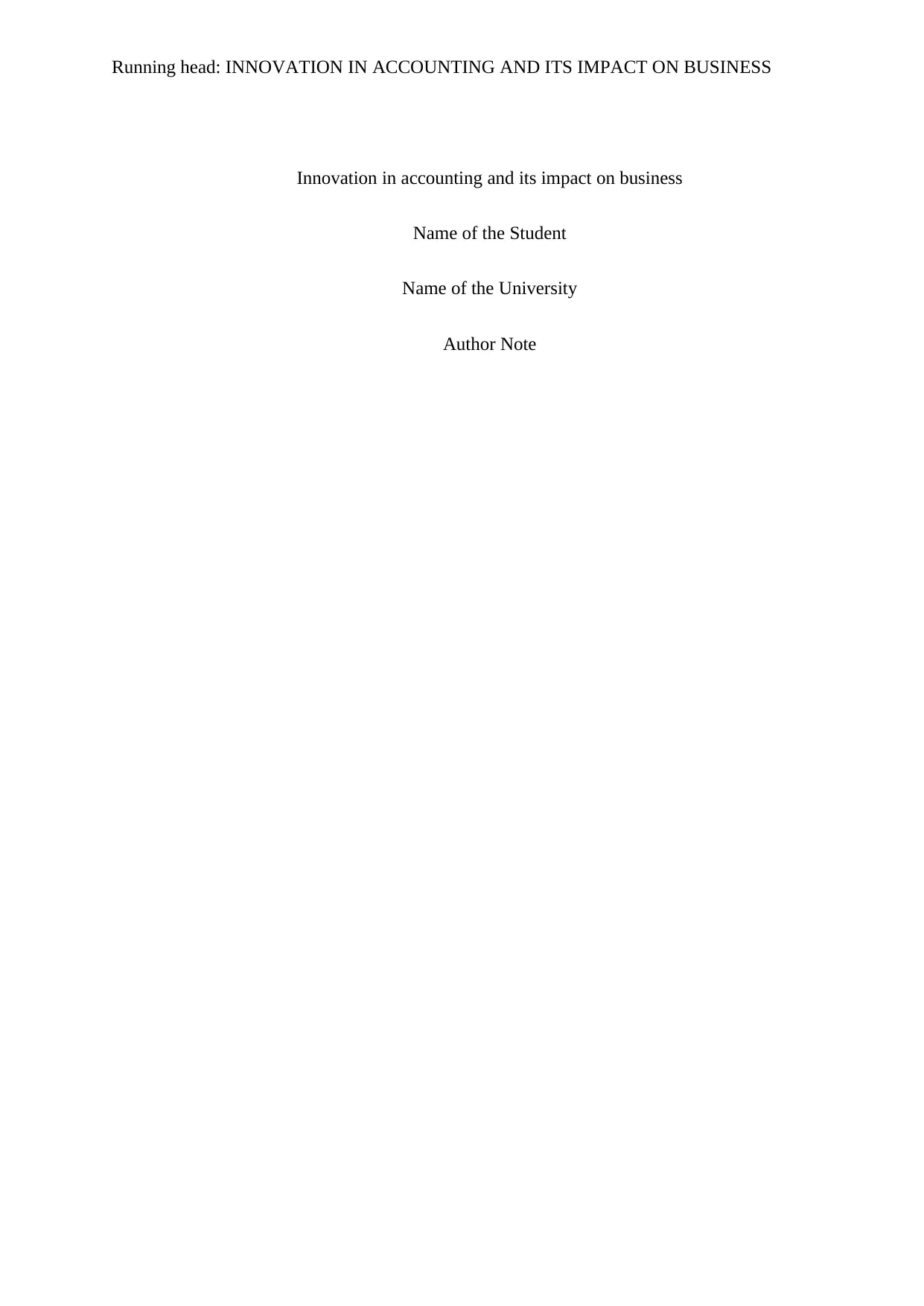
Running head: INNOVATION IN ACCOUNTING AND ITS IMPACT ON BUSINESS
Innovation in accounting and its impact on business
Name of the Student
Name of the University
Author Note
Innovation in accounting and its impact on business
Name of the Student
Name of the University
Author Note
Paraphrase This Document
Need a fresh take? Get an instant paraphrase of this document with our AI Paraphraser
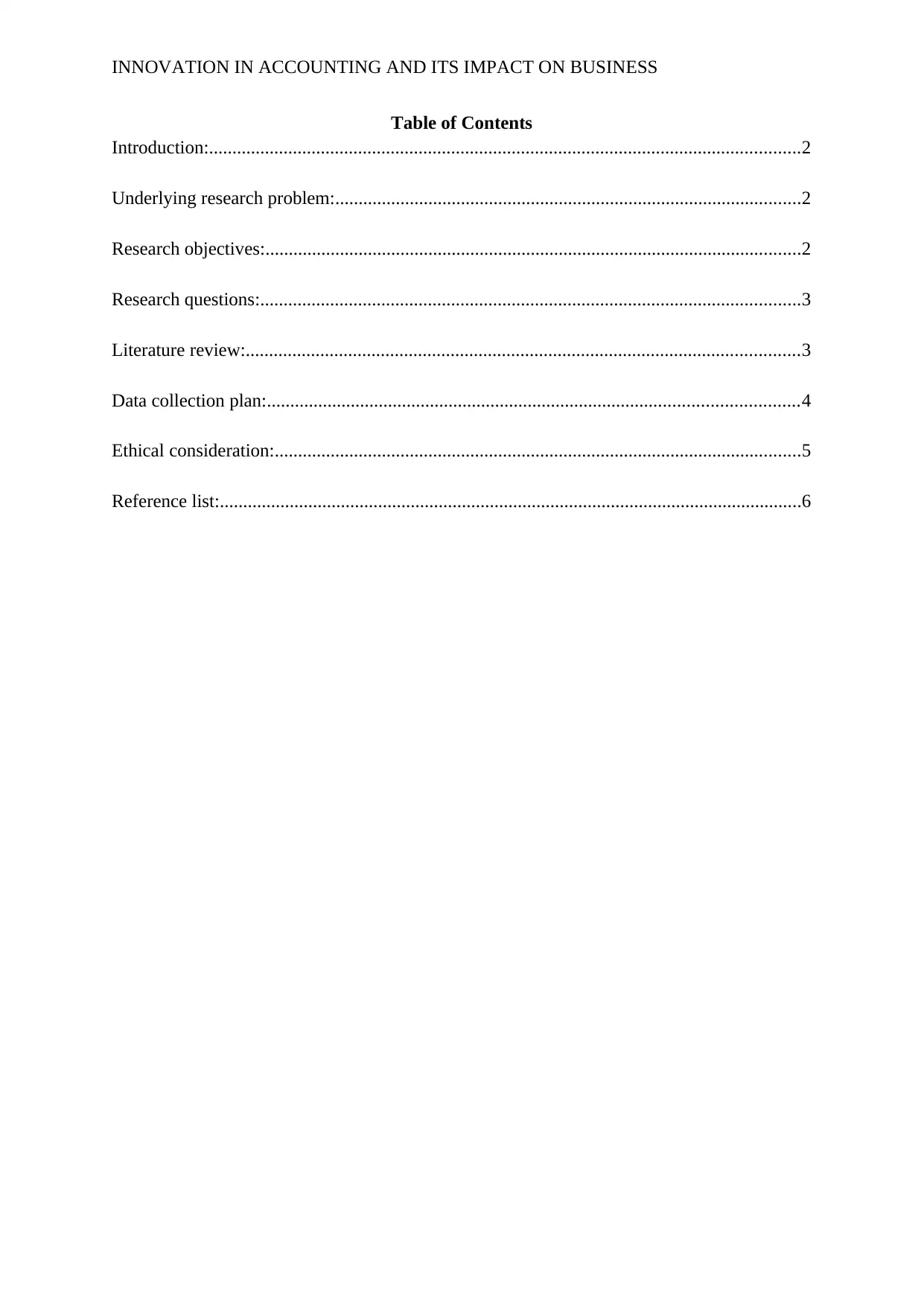
INNOVATION IN ACCOUNTING AND ITS IMPACT ON BUSINESS
Table of Contents
Introduction:...............................................................................................................................2
Underlying research problem:....................................................................................................2
Research objectives:...................................................................................................................2
Research questions:....................................................................................................................3
Literature review:.......................................................................................................................3
Data collection plan:..................................................................................................................4
Ethical consideration:.................................................................................................................5
Reference list:.............................................................................................................................6
Table of Contents
Introduction:...............................................................................................................................2
Underlying research problem:....................................................................................................2
Research objectives:...................................................................................................................2
Research questions:....................................................................................................................3
Literature review:.......................................................................................................................3
Data collection plan:..................................................................................................................4
Ethical consideration:.................................................................................................................5
Reference list:.............................................................................................................................6
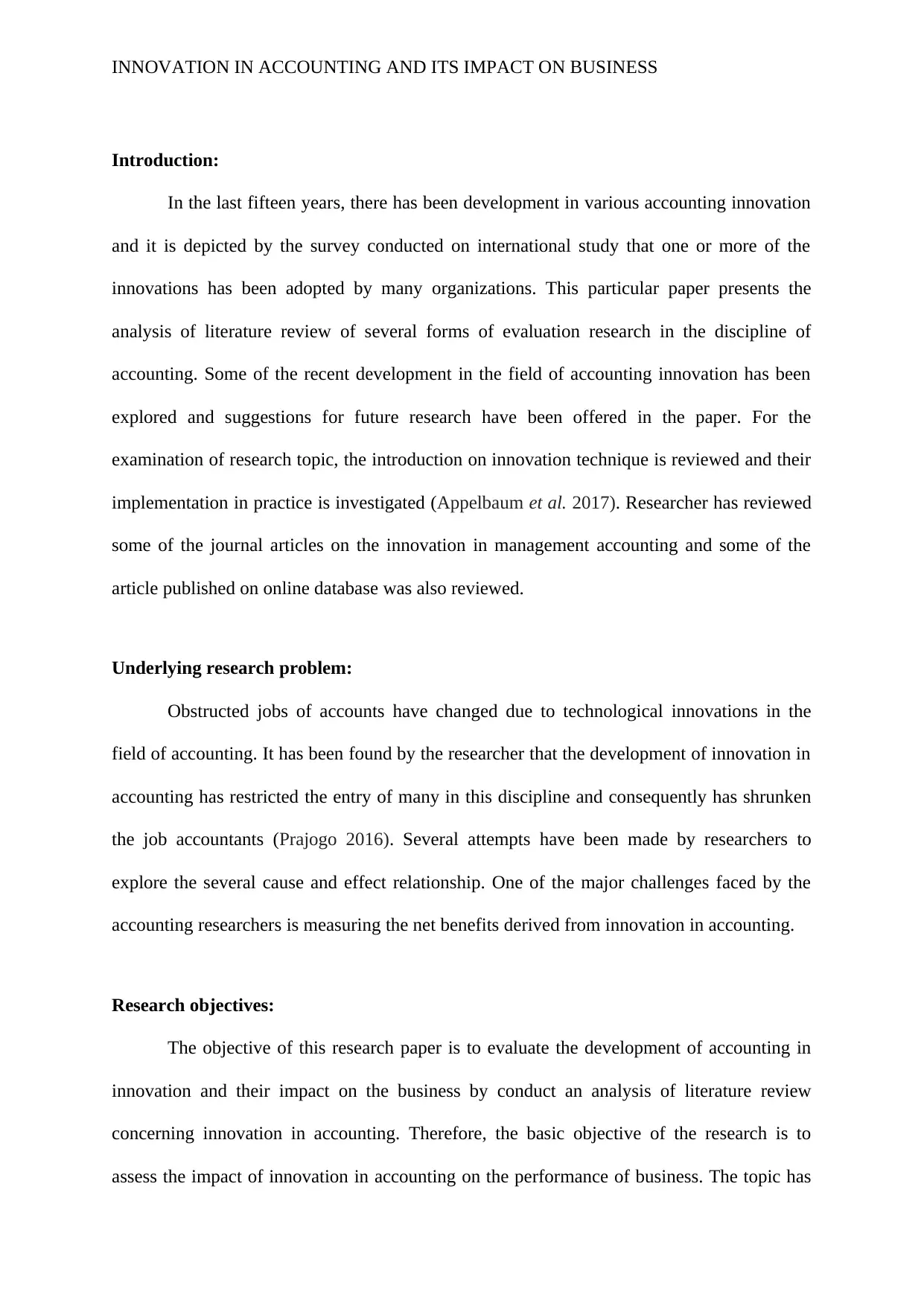
INNOVATION IN ACCOUNTING AND ITS IMPACT ON BUSINESS
Introduction:
In the last fifteen years, there has been development in various accounting innovation
and it is depicted by the survey conducted on international study that one or more of the
innovations has been adopted by many organizations. This particular paper presents the
analysis of literature review of several forms of evaluation research in the discipline of
accounting. Some of the recent development in the field of accounting innovation has been
explored and suggestions for future research have been offered in the paper. For the
examination of research topic, the introduction on innovation technique is reviewed and their
implementation in practice is investigated (Appelbaum et al. 2017). Researcher has reviewed
some of the journal articles on the innovation in management accounting and some of the
article published on online database was also reviewed.
Underlying research problem:
Obstructed jobs of accounts have changed due to technological innovations in the
field of accounting. It has been found by the researcher that the development of innovation in
accounting has restricted the entry of many in this discipline and consequently has shrunken
the job accountants (Prajogo 2016). Several attempts have been made by researchers to
explore the several cause and effect relationship. One of the major challenges faced by the
accounting researchers is measuring the net benefits derived from innovation in accounting.
Research objectives:
The objective of this research paper is to evaluate the development of accounting in
innovation and their impact on the business by conduct an analysis of literature review
concerning innovation in accounting. Therefore, the basic objective of the research is to
assess the impact of innovation in accounting on the performance of business. The topic has
Introduction:
In the last fifteen years, there has been development in various accounting innovation
and it is depicted by the survey conducted on international study that one or more of the
innovations has been adopted by many organizations. This particular paper presents the
analysis of literature review of several forms of evaluation research in the discipline of
accounting. Some of the recent development in the field of accounting innovation has been
explored and suggestions for future research have been offered in the paper. For the
examination of research topic, the introduction on innovation technique is reviewed and their
implementation in practice is investigated (Appelbaum et al. 2017). Researcher has reviewed
some of the journal articles on the innovation in management accounting and some of the
article published on online database was also reviewed.
Underlying research problem:
Obstructed jobs of accounts have changed due to technological innovations in the
field of accounting. It has been found by the researcher that the development of innovation in
accounting has restricted the entry of many in this discipline and consequently has shrunken
the job accountants (Prajogo 2016). Several attempts have been made by researchers to
explore the several cause and effect relationship. One of the major challenges faced by the
accounting researchers is measuring the net benefits derived from innovation in accounting.
Research objectives:
The objective of this research paper is to evaluate the development of accounting in
innovation and their impact on the business by conduct an analysis of literature review
concerning innovation in accounting. Therefore, the basic objective of the research is to
assess the impact of innovation in accounting on the performance of business. The topic has
⊘ This is a preview!⊘
Do you want full access?
Subscribe today to unlock all pages.

Trusted by 1+ million students worldwide
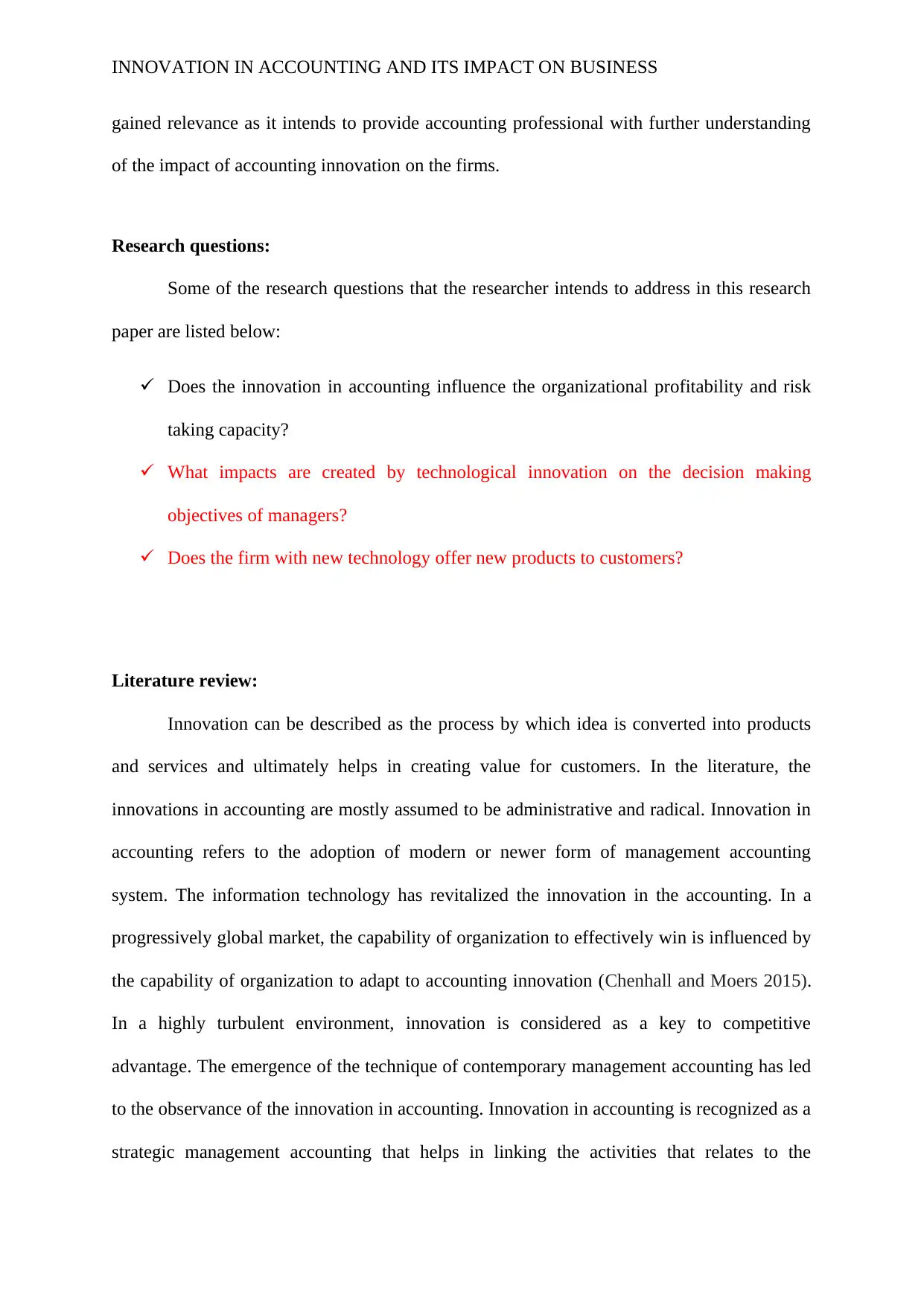
INNOVATION IN ACCOUNTING AND ITS IMPACT ON BUSINESS
gained relevance as it intends to provide accounting professional with further understanding
of the impact of accounting innovation on the firms.
Research questions:
Some of the research questions that the researcher intends to address in this research
paper are listed below:
Does the innovation in accounting influence the organizational profitability and risk
taking capacity?
What impacts are created by technological innovation on the decision making
objectives of managers?
Does the firm with new technology offer new products to customers?
Literature review:
Innovation can be described as the process by which idea is converted into products
and services and ultimately helps in creating value for customers. In the literature, the
innovations in accounting are mostly assumed to be administrative and radical. Innovation in
accounting refers to the adoption of modern or newer form of management accounting
system. The information technology has revitalized the innovation in the accounting. In a
progressively global market, the capability of organization to effectively win is influenced by
the capability of organization to adapt to accounting innovation (Chenhall and Moers 2015).
In a highly turbulent environment, innovation is considered as a key to competitive
advantage. The emergence of the technique of contemporary management accounting has led
to the observance of the innovation in accounting. Innovation in accounting is recognized as a
strategic management accounting that helps in linking the activities that relates to the
gained relevance as it intends to provide accounting professional with further understanding
of the impact of accounting innovation on the firms.
Research questions:
Some of the research questions that the researcher intends to address in this research
paper are listed below:
Does the innovation in accounting influence the organizational profitability and risk
taking capacity?
What impacts are created by technological innovation on the decision making
objectives of managers?
Does the firm with new technology offer new products to customers?
Literature review:
Innovation can be described as the process by which idea is converted into products
and services and ultimately helps in creating value for customers. In the literature, the
innovations in accounting are mostly assumed to be administrative and radical. Innovation in
accounting refers to the adoption of modern or newer form of management accounting
system. The information technology has revitalized the innovation in the accounting. In a
progressively global market, the capability of organization to effectively win is influenced by
the capability of organization to adapt to accounting innovation (Chenhall and Moers 2015).
In a highly turbulent environment, innovation is considered as a key to competitive
advantage. The emergence of the technique of contemporary management accounting has led
to the observance of the innovation in accounting. Innovation in accounting is recognized as a
strategic management accounting that helps in linking the activities that relates to the
Paraphrase This Document
Need a fresh take? Get an instant paraphrase of this document with our AI Paraphraser
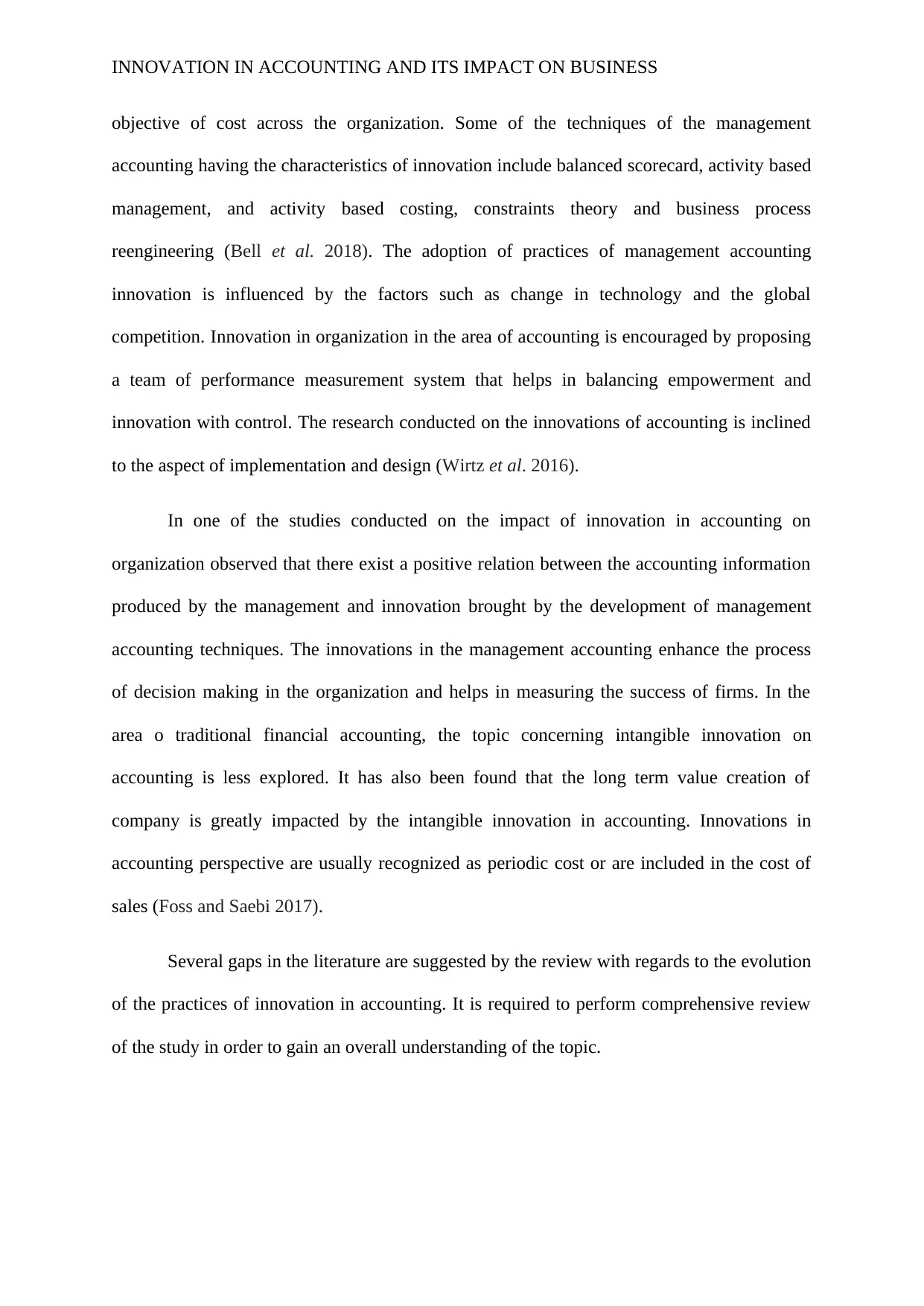
INNOVATION IN ACCOUNTING AND ITS IMPACT ON BUSINESS
objective of cost across the organization. Some of the techniques of the management
accounting having the characteristics of innovation include balanced scorecard, activity based
management, and activity based costing, constraints theory and business process
reengineering (Bell et al. 2018). The adoption of practices of management accounting
innovation is influenced by the factors such as change in technology and the global
competition. Innovation in organization in the area of accounting is encouraged by proposing
a team of performance measurement system that helps in balancing empowerment and
innovation with control. The research conducted on the innovations of accounting is inclined
to the aspect of implementation and design (Wirtz et al. 2016).
In one of the studies conducted on the impact of innovation in accounting on
organization observed that there exist a positive relation between the accounting information
produced by the management and innovation brought by the development of management
accounting techniques. The innovations in the management accounting enhance the process
of decision making in the organization and helps in measuring the success of firms. In the
area o traditional financial accounting, the topic concerning intangible innovation on
accounting is less explored. It has also been found that the long term value creation of
company is greatly impacted by the intangible innovation in accounting. Innovations in
accounting perspective are usually recognized as periodic cost or are included in the cost of
sales (Foss and Saebi 2017).
Several gaps in the literature are suggested by the review with regards to the evolution
of the practices of innovation in accounting. It is required to perform comprehensive review
of the study in order to gain an overall understanding of the topic.
objective of cost across the organization. Some of the techniques of the management
accounting having the characteristics of innovation include balanced scorecard, activity based
management, and activity based costing, constraints theory and business process
reengineering (Bell et al. 2018). The adoption of practices of management accounting
innovation is influenced by the factors such as change in technology and the global
competition. Innovation in organization in the area of accounting is encouraged by proposing
a team of performance measurement system that helps in balancing empowerment and
innovation with control. The research conducted on the innovations of accounting is inclined
to the aspect of implementation and design (Wirtz et al. 2016).
In one of the studies conducted on the impact of innovation in accounting on
organization observed that there exist a positive relation between the accounting information
produced by the management and innovation brought by the development of management
accounting techniques. The innovations in the management accounting enhance the process
of decision making in the organization and helps in measuring the success of firms. In the
area o traditional financial accounting, the topic concerning intangible innovation on
accounting is less explored. It has also been found that the long term value creation of
company is greatly impacted by the intangible innovation in accounting. Innovations in
accounting perspective are usually recognized as periodic cost or are included in the cost of
sales (Foss and Saebi 2017).
Several gaps in the literature are suggested by the review with regards to the evolution
of the practices of innovation in accounting. It is required to perform comprehensive review
of the study in order to gain an overall understanding of the topic.
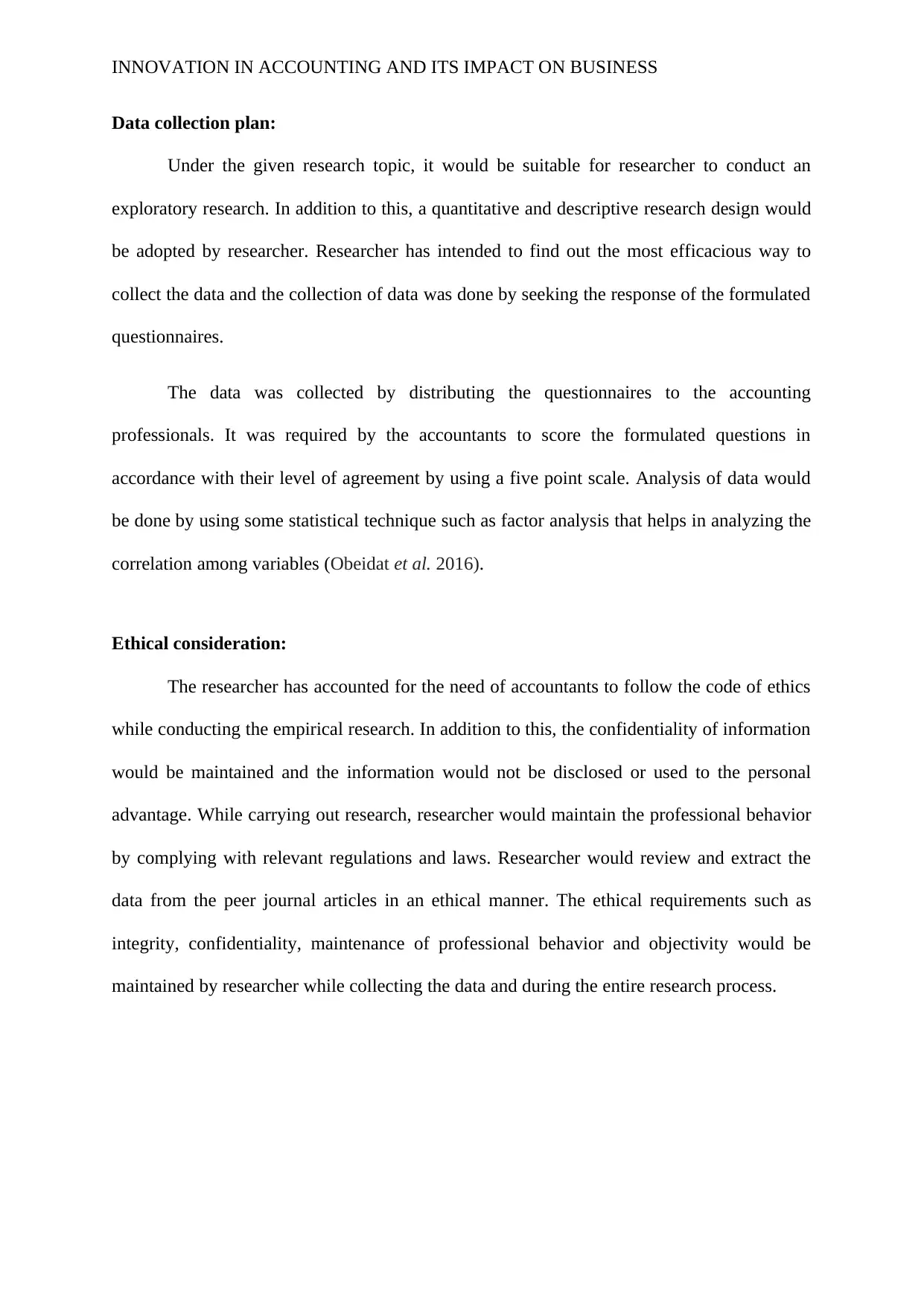
INNOVATION IN ACCOUNTING AND ITS IMPACT ON BUSINESS
Data collection plan:
Under the given research topic, it would be suitable for researcher to conduct an
exploratory research. In addition to this, a quantitative and descriptive research design would
be adopted by researcher. Researcher has intended to find out the most efficacious way to
collect the data and the collection of data was done by seeking the response of the formulated
questionnaires.
The data was collected by distributing the questionnaires to the accounting
professionals. It was required by the accountants to score the formulated questions in
accordance with their level of agreement by using a five point scale. Analysis of data would
be done by using some statistical technique such as factor analysis that helps in analyzing the
correlation among variables (Obeidat et al. 2016).
Ethical consideration:
The researcher has accounted for the need of accountants to follow the code of ethics
while conducting the empirical research. In addition to this, the confidentiality of information
would be maintained and the information would not be disclosed or used to the personal
advantage. While carrying out research, researcher would maintain the professional behavior
by complying with relevant regulations and laws. Researcher would review and extract the
data from the peer journal articles in an ethical manner. The ethical requirements such as
integrity, confidentiality, maintenance of professional behavior and objectivity would be
maintained by researcher while collecting the data and during the entire research process.
Data collection plan:
Under the given research topic, it would be suitable for researcher to conduct an
exploratory research. In addition to this, a quantitative and descriptive research design would
be adopted by researcher. Researcher has intended to find out the most efficacious way to
collect the data and the collection of data was done by seeking the response of the formulated
questionnaires.
The data was collected by distributing the questionnaires to the accounting
professionals. It was required by the accountants to score the formulated questions in
accordance with their level of agreement by using a five point scale. Analysis of data would
be done by using some statistical technique such as factor analysis that helps in analyzing the
correlation among variables (Obeidat et al. 2016).
Ethical consideration:
The researcher has accounted for the need of accountants to follow the code of ethics
while conducting the empirical research. In addition to this, the confidentiality of information
would be maintained and the information would not be disclosed or used to the personal
advantage. While carrying out research, researcher would maintain the professional behavior
by complying with relevant regulations and laws. Researcher would review and extract the
data from the peer journal articles in an ethical manner. The ethical requirements such as
integrity, confidentiality, maintenance of professional behavior and objectivity would be
maintained by researcher while collecting the data and during the entire research process.
⊘ This is a preview!⊘
Do you want full access?
Subscribe today to unlock all pages.

Trusted by 1+ million students worldwide
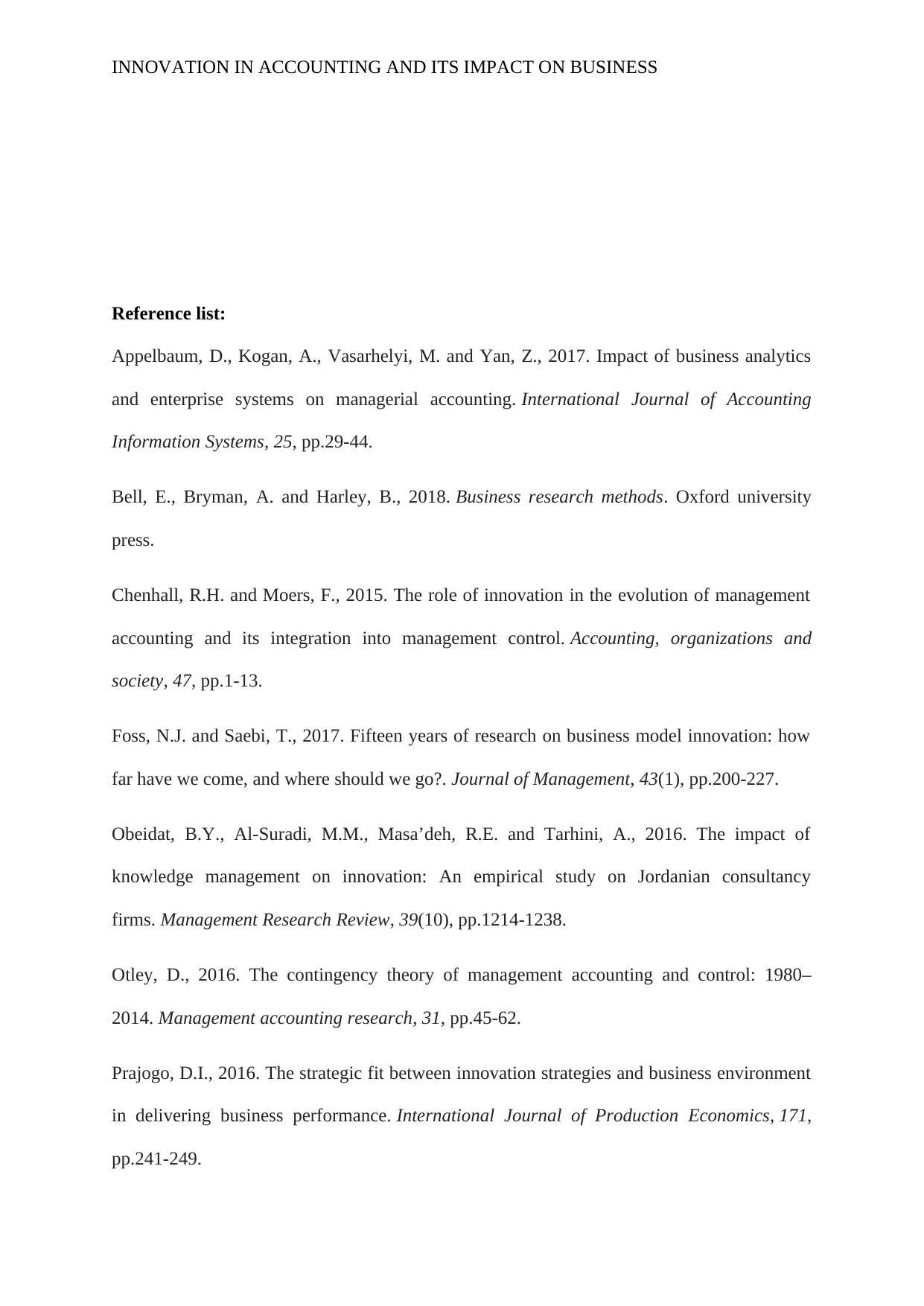
INNOVATION IN ACCOUNTING AND ITS IMPACT ON BUSINESS
Reference list:
Appelbaum, D., Kogan, A., Vasarhelyi, M. and Yan, Z., 2017. Impact of business analytics
and enterprise systems on managerial accounting. International Journal of Accounting
Information Systems, 25, pp.29-44.
Bell, E., Bryman, A. and Harley, B., 2018. Business research methods. Oxford university
press.
Chenhall, R.H. and Moers, F., 2015. The role of innovation in the evolution of management
accounting and its integration into management control. Accounting, organizations and
society, 47, pp.1-13.
Foss, N.J. and Saebi, T., 2017. Fifteen years of research on business model innovation: how
far have we come, and where should we go?. Journal of Management, 43(1), pp.200-227.
Obeidat, B.Y., Al-Suradi, M.M., Masa’deh, R.E. and Tarhini, A., 2016. The impact of
knowledge management on innovation: An empirical study on Jordanian consultancy
firms. Management Research Review, 39(10), pp.1214-1238.
Otley, D., 2016. The contingency theory of management accounting and control: 1980–
2014. Management accounting research, 31, pp.45-62.
Prajogo, D.I., 2016. The strategic fit between innovation strategies and business environment
in delivering business performance. International Journal of Production Economics, 171,
pp.241-249.
Reference list:
Appelbaum, D., Kogan, A., Vasarhelyi, M. and Yan, Z., 2017. Impact of business analytics
and enterprise systems on managerial accounting. International Journal of Accounting
Information Systems, 25, pp.29-44.
Bell, E., Bryman, A. and Harley, B., 2018. Business research methods. Oxford university
press.
Chenhall, R.H. and Moers, F., 2015. The role of innovation in the evolution of management
accounting and its integration into management control. Accounting, organizations and
society, 47, pp.1-13.
Foss, N.J. and Saebi, T., 2017. Fifteen years of research on business model innovation: how
far have we come, and where should we go?. Journal of Management, 43(1), pp.200-227.
Obeidat, B.Y., Al-Suradi, M.M., Masa’deh, R.E. and Tarhini, A., 2016. The impact of
knowledge management on innovation: An empirical study on Jordanian consultancy
firms. Management Research Review, 39(10), pp.1214-1238.
Otley, D., 2016. The contingency theory of management accounting and control: 1980–
2014. Management accounting research, 31, pp.45-62.
Prajogo, D.I., 2016. The strategic fit between innovation strategies and business environment
in delivering business performance. International Journal of Production Economics, 171,
pp.241-249.
Paraphrase This Document
Need a fresh take? Get an instant paraphrase of this document with our AI Paraphraser
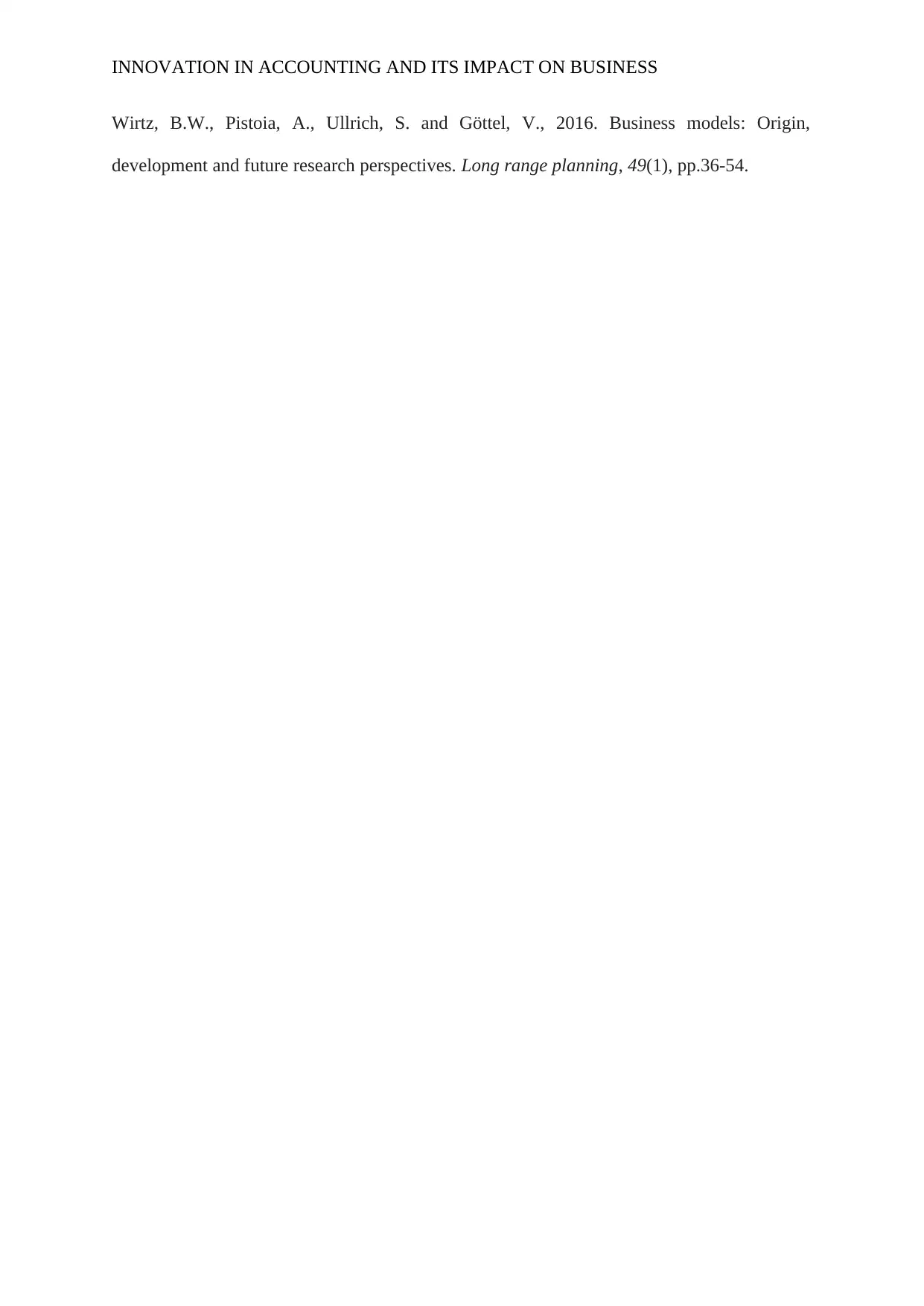
INNOVATION IN ACCOUNTING AND ITS IMPACT ON BUSINESS
Wirtz, B.W., Pistoia, A., Ullrich, S. and Göttel, V., 2016. Business models: Origin,
development and future research perspectives. Long range planning, 49(1), pp.36-54.
Wirtz, B.W., Pistoia, A., Ullrich, S. and Göttel, V., 2016. Business models: Origin,
development and future research perspectives. Long range planning, 49(1), pp.36-54.
1 out of 8
Related Documents
Your All-in-One AI-Powered Toolkit for Academic Success.
+13062052269
info@desklib.com
Available 24*7 on WhatsApp / Email
![[object Object]](/_next/static/media/star-bottom.7253800d.svg)
Unlock your academic potential
Copyright © 2020–2026 A2Z Services. All Rights Reserved. Developed and managed by ZUCOL.




